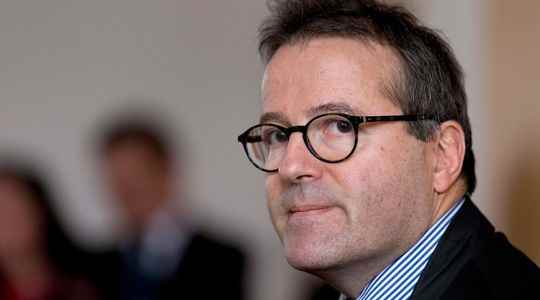Discreet glasses screwed on the nose, Martin Hirsch looked like the first of the class. Emblematic but contested boss of the Public Assistance-Hospitals of Paris (AP-HP), this son of a communicator will leave his post at the end of June, leaving behind a public hospital mired in an unprecedented crisis. At the dawn of the wave of Covid-19 which was going to sweep over the healthcare system, he had promised “a hospital model different from what it was before, closer to our expectations and our ambitions to all”.
Officially, it is because he cannot fulfill the mission he had given himself that Martin Hirsch, 58, announced his departure from this colossus of health system, which employs more than 100,000 people and runs 38 hospitals. He had been its managing director since 2013. At the time of his departure, his results remained mixed, while the establishments were operating at just-in-time and facing an economic and systemic crisis. Nicolas Revel is one of the favorites to succeed him at the head of the AP-HP
And the former chief of staff of Jean Castex at Matignon will have his work cut out, because the figures are dizzying. At the beginning of May 2022, 1,400 nursing positions were still vacant and there were between 10 and 20% closed beds. Added to this are 30% of operating theaters at a standstill. Congested hospitals, growing medical deserts, “loss of meaning” of the profession for staff, emergency services on the verge of implosion: the wounds of the healthcare system are raw at the end of more than two years of pandemic, which has hurt caregivers.
“The observation that we can make is that the current situation of the AP-HP is critical from all points of view”, underlines to L’Express Djillali Annane, head of the intensive care unit of the hospital. Raymond-Poincaré in Garches. The health professional does not place this heavy burden on the shoulders of Martin Hirsch alone. “We can’t give him all the blame,” he admits. But some of these colleagues display more clear-cut reactions: “He’s a real killer. He has accelerated the processes already underway in the public hospital”, comments, acid, Christophe Prud’homme, emergency doctor at Samu 93 and responsible to the CGT Federation of Health and Social Action.
Martin Hirsch “can no longer embody change”
“He leaves the ship before it sinks, after having commanded it for nine years”, tackles Marion Malphettes, doctor in the immuno-pathology department – threatened with closure – of the Saint-Louis hospital in Paris. In May, a group of doctors had published in The Echoes a vitriolic platform denouncing its “disastrous balance sheet” and listing a “degraded” budgetary situation or even an attractiveness at half mast. Is it the right time to leave the AP-HP when the boat is sinking? “Yes, it’s the right time. The negative dynamic of the public hospital is accelerating and the health system must be restored in France. A man at the head of the AP-HP for nine years can no longer embody change”, assures the head of the intensive care unit at Raymond-Poincaré hospital.
For many, the head of the largest university hospital in Europe remains the face of savings and the reorganization of working time. In 2015, he led the reform of the 35 hours at the AP-HP, garnering repeated strikes at the time. “It hides what put them in the wall: the absence of recruitment. The 35 hours generated RTT, days of rest, not compensated by recruitments”, unfolds the collective of professionals in the tribune of Echoes. In addition, several hospital projects that he had relaunched are still not finished, like the new Hôtel-Dieu initially expected for 2020.
What is the president’s vision “on what health will be like in 2030”?
More recently, the temporary closure of the La Collégiale geriatric hospital, at the end of May, had aroused the incomprehension of the staff who opposed the decision of the management. “It’s a small hospital in which there are no toilets or bathrooms in the rooms. […]half occupied”, had justified Martin Hirsch, who said “preferred to concentrate the forces and the patients in the hospitals next door.”
On his management of the pandemic, Martin Hirsch had managed to show another face. He did not hesitate to install a camp bed in his office for nights of crisis, recalls the newspaper of Echoes. “The hospital knows how to react to crises, but it pays the price afterwards,” he said in a long interview with L’Express in November 2021, adding that it was necessary to continue the reforms. On the aspect of the health crisis, Djilalli Annane retains a bitter taste: “In terms of the management of Covid-19, I think we could have done better overall.”
At the top of the state, Martin Hirsch was not unanimous either. He had a notoriously difficult relationship with the executive, regularly annoyed by positions deemed sometimes stinging or too alarmist during the health crisis, according to several government sources. Asked about the departure of the boss of the AP-HP, the new Minister of Health Brigitte Bourguignon on the move in Vienne, soberly “welcomed the work he provided during these years for the public service”.
Admittedly, health professionals are hoping for changes from Martin Hirsch’s successor, but there are still many expectations regarding the executive. “What we deeply miss is the vision of the President of the Republic, on what health will be like in 2030”, concludes Djillali Annane.
